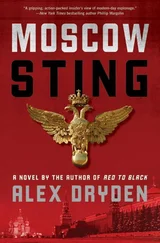But despite this psychological link between the two generals, it was notable that they sat as far from each other as the seating allowed, each pushed up against their respective rear doors. They were rivals and, in Russia’s medievally clannish political and intelligence world, they had often found themselves working against each other. General Victorov was from the core of the SVR, Russia’s first chief directorate and the successor to the KGB’s foreign intelligence department. The other veteran, General Antonov, was from GRU, Russia’s main intelligence directorate.
The two men didn’t talk and spent most of the journey looking away from each other and out of the windows on either side of the car, though the view was obscured almost completely by the white-out conditions, except for the thin, bunched-together trunks of birch and fir trees that took shape as they approached the Forest.
They also both wore tight-lipped expressions that suggested even sharing the same car was an imposition. But that was the way it had been arranged by the prime minister’s office and they hadn’t been given the choice to travel separately. It was as if this enforced journey together was a test of sorts in itself. “You’ll be working together”—that had been the order. But they had never worked together in any commonly accepted way.
The relative seniority between the two men was hard to judge—not least by themselves—but their rivalry was evident in the tension that existed between them. General Antonov deployed five or six times more agents on foreign soil than the SVR, and he personally commanded twenty-five thousand special forces troops, or spetsnaz. But it was the SVR that considered itself the elite foreign intelligence force and it was the SVR headquarters in Balashiha—the Forest, in KGB parlance—to which they were going. General Viktorov of the SVR was also a central figure in the elite of elites—the directorate’s highly secretive Department S. This inner clan of foreign intelligence officers was in charge of training foreigners to spy for the Kremlin, and then to commit terrorist acts back in their own countries. Viktorov’s highly sensitive department had achieved several important assassinations in the past year alone.
But in addition to being at the heart of Department S, Viktorov had the vital advantage of having closer personal access to Prime Minister Vladimir Putin than his rival. The two of them were actually friends outside the day-to-day business of the intelligence world, and skied and hunted together. In Putin’s baronial court where rank was often a secondary consideration after personal favour—and favours—this probably gave Viktorov the edge.
In the last few miles of their journey perhaps each was thinking over the purpose of this predawn meeting with Putin. But, more likely, each was thinking of his own strategy of personal preeminence when they met Putin, regardless of the purpose of the meeting. And each of them was certainly in a state of anxious speculation that the other knew more, had been briefed prior to this journey, had been taken into the confidence of the prime minister more closely. The usual fear of some loss of favour with Putin plagued them both. And that was how the Kremlin played its games. You never got used to that, Viktorov was thinking. Rule was administered through anxiety and fear, just as it had always been.
The snowplows had been out all night to keep the vital road connecting the Kremlin and its intelligence heart clearer than any other in Russia, and the car finally swung through the high gates—razor wire and gun turrets disappearing into the snow on either side. The generals’ identities were shown and logged by the guards. The Mercedes pulled up half a mile beyond the entrance, outside a long, low building, most of which was concealed beneath the earth.
It was Golubev, the special assistant from the prime minister’s office, who was there to meet them. A chivvying young man with a foolishly small moustache, Golubev was a product of the new, post-Soviet era. He was a politician-lawyer rather than a soldier—let alone an intelligence officer—and therefore the kind of bureaucratic ministry man who elicited little respect from either of the generals. His youth allowed no memory of the defeat in Afghanistan or even of the collapse of the entire Soviet Union two years later. Unlike the generals, Golubev looked to the future at the expense of nurturing the past and its humiliations. And, to the generals, he also looked to the future at the expense of redressing the balance that had been lost in the past twenty years since the Soviet Union collapsed. That balance—in the dreams of many like them—was the restoration of the Russian empire.
With a fussiness that disguised fears of his own, Golubev brushed imaginary dust from the lapels of his jacket, smoothed its sides, and then led the generals through cream-painted concrete corridors to an elevator that took them down four floors into the earth and finally into a brightly lit room the size of a tennis court. It was one of several operations rooms in this core SVR building and Viktorov knew it well. It was here that many undercover missions had been planned, from the wars in Chechnya to foreign assassinations in the Middle East and Europe. Long, identical tables were laid out in neat rows, each with a harsh light over it, and at a casual glance the whole space might have suggested a snooker club.
Golubev proceeded to a table near the centre of this space and pulled up two tall chairs for the generals that offered a view down onto the high table, and then one for himself, which he never sat on.
At once, Viktorov looked at several maps that had been opened on this long table. The particular map that caught his eye—it was in the centre of the table, which was at the centre of the room—was of the Soviet Union. It was a pre-1991 map, in other words, from a time before the Soviet Union had broken up. Viktorov was pleasantly surprised, as if he was looking at a recently discovered family treasure that had been uncovered in the clearing out of an old attic, and he took a greater interest. He saw another map of the period, and of equal size, next to it that was a close-up of part of the former empire. It had been titled “Little Russia,” but only by a scrawl on a yellow Post-it note stuck to the top. The name on the map itself, however, was “Ukrainian SSR.”
“When is the prime minister arriving?” Viktorov asked, looking down on Golubev from the tall seat. Golubev fidgeted uncomfortably. Viktorov was a big, muscled man, despite his age, and he took care about his appearance and his physical fitness. His eyebrows were artfully shaped to eliminate the wild-growing hairs that age had unleashed, and the skin of his face had a polished, pampered appearance. General Antonov, on the other hand, was ruddy in complexion and had allowed the hairs of his advancing age to grow like weeds in an abandoned courtyard. The one general affected a modern, careful appearance, while the other seemed to seek the virtues of a rugged lack of vanity.
“You’ll be meeting with some colleagues first,” Golubev said. “The prime minister has been detained.”
“Colleagues?” Antonov queried. “For how long?”
“Patriotiy,” Golubev replied almost mutely, as if embarrassed at the mention of this informal, almost underground group that was definitely not part of his modern Russian vision. “We are waiting for the prime minister’s call,” he added.
“Ah,” Viktorov said. “Our Patriotiy friends. That’s the reason for the map, then.” He was pleased to be meeting with fellows and, no doubt, old colleagues, too, from the Patriotiy.
Golubev didn’t reply. But the generals relaxed into their seats as the nervous ministry man ordered coffee to be brought.
Читать дальше












